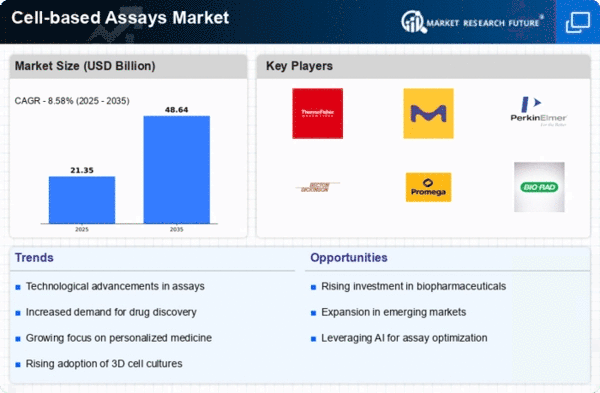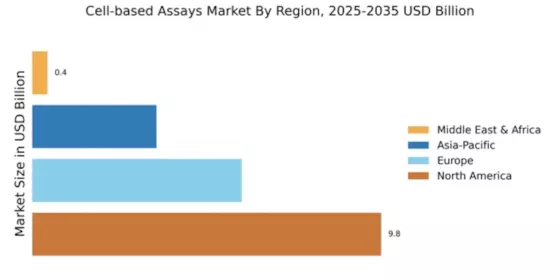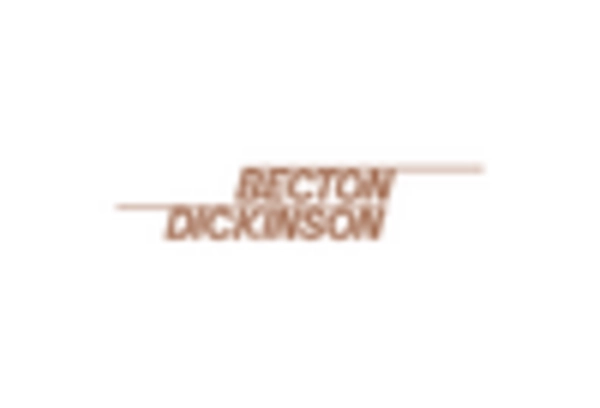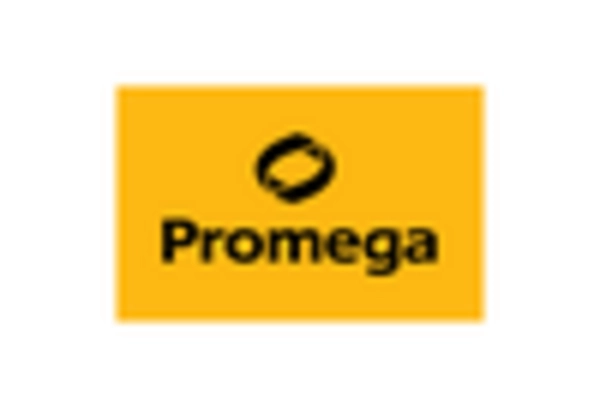Market Growth Projections
The Global Cell-based Assay Market Industry is projected to experience substantial growth over the coming years. With an estimated market value of 19.7 USD Billion in 2024, the industry is expected to expand to 48.6 USD Billion by 2035. This growth trajectory indicates a compound annual growth rate of 8.58% from 2025 to 2035, reflecting the increasing adoption of cell-based assays across various sectors, including pharmaceuticals, biotechnology, and academic research. The rising demand for innovative drug discovery methods and personalized medicine further supports this upward trend, positioning the Global Cell-based Assay Market Industry as a dynamic and evolving field.
Rising Demand for Drug Discovery
The Global Cell-based Assay Market Industry experiences a notable surge in demand driven by the pharmaceutical sector's need for innovative drug discovery methods. As the industry evolves, cell-based assays provide critical insights into drug efficacy and toxicity, facilitating the development of safer and more effective therapeutics. In 2024, the market is projected to reach 19.7 USD Billion, reflecting the increasing reliance on these assays for high-throughput screening and lead optimization. This trend is expected to continue, with the market projected to grow significantly as pharmaceutical companies invest in advanced technologies to enhance their research capabilities.
Increasing Focus on Personalized Medicine
The Global Cell-based Assay Market Industry is significantly influenced by the growing emphasis on personalized medicine. As healthcare shifts towards tailored therapies, cell-based assays provide essential tools for understanding individual patient responses to treatments. This trend is particularly relevant in oncology, where assays can help identify specific biomarkers and predict therapeutic outcomes. The market's expansion is evident, with projections indicating growth from 19.7 USD Billion in 2024 to 48.6 USD Billion by 2035. This shift towards personalized approaches necessitates the continued development and application of cell-based assays, positioning them as vital components in the future of healthcare.
Regulatory Support for Biopharmaceuticals
Regulatory support for biopharmaceuticals significantly impacts the Global Cell-based Assay Market Industry. Governments and regulatory bodies are increasingly recognizing the importance of cell-based assays in the evaluation of biopharmaceutical products. This support is reflected in streamlined approval processes and guidelines that encourage the adoption of these assays in clinical trials. As biopharmaceutical companies leverage cell-based assays to demonstrate product safety and efficacy, the market is poised for growth. The increasing number of biopharmaceuticals entering the market further underscores the relevance of cell-based assays, contributing to the industry's expansion and innovation.
Growing Applications in Toxicology Testing
The Global Cell-based Assay Market Industry is witnessing a rise in applications related to toxicology testing. As regulatory agencies emphasize the need for alternative testing methods, cell-based assays offer a viable solution for assessing the safety of chemicals and pharmaceuticals. These assays provide insights into cellular responses to toxic substances, thereby reducing reliance on animal testing. The market's growth trajectory is supported by the increasing demand for safer and more ethical testing methods. As the industry evolves, the integration of cell-based assays into toxicology testing protocols is expected to enhance safety assessments and regulatory compliance.
Technological Advancements in Assay Development
Technological advancements play a pivotal role in shaping the Global Cell-based Assay Market Industry. Innovations such as automated platforms, microfluidics, and high-content screening technologies enhance the efficiency and accuracy of assays. These developments enable researchers to conduct complex experiments with greater precision, thereby accelerating the drug development process. The integration of artificial intelligence and machine learning into assay design further optimizes data analysis and interpretation. As a result, the market is anticipated to expand, with a compound annual growth rate of 8.58% projected from 2025 to 2035, indicating a robust future for technologically advanced cell-based assays.


















